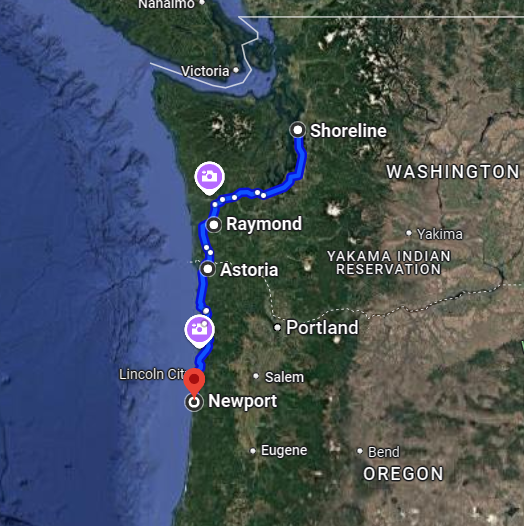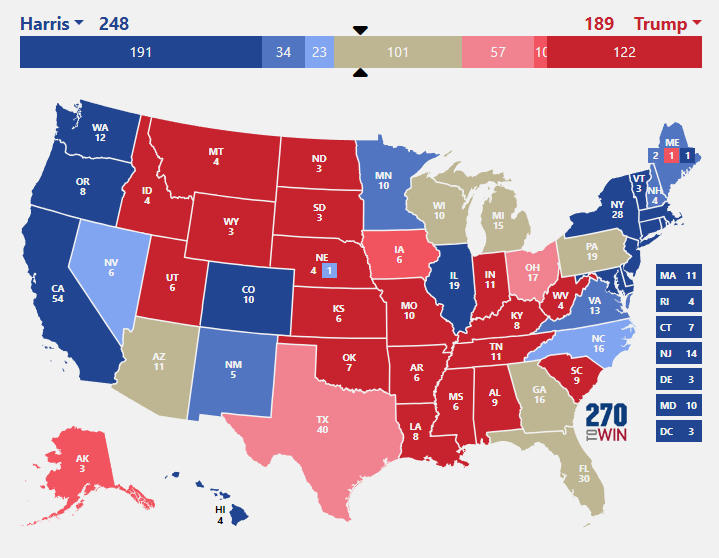Travelogue I

Day 1
Giving my new-to-me car "a proper shakedown," as Mr. Scott might say, I am driving my way down to southern California in my annual visit to see Dad and Marty over Dad's birthday. It can be done in a day and a half, and I have done, but I opted to take an extra day and take the coastal route, at least for the northern half of the trip.
Southwest Washington state is nice enough (though I could have done without the several TRUMP and REICHERT signs plastered near the roadways), but the Oregon coast is the reason for coming this way, along with the general appeal of passing through a bunch of small towns. Astoria was a nice stop, though I didn't see much of it. Driving along the north Oregon coast at night was nice, though a drawback that I hadn't thought of in advance made me question my decision: fog. Fog makes it pretty tough to appreciate the surroundings while passing through, plus it slows things down quite a bit.
Oh well, tomorrow will be Oregon in daylight, followed by a stop at Redwoods National Park for a hike, then a nighttime drive to the Bay Area and a start on the next leg of the drive.
The shakedown on the Prius is positive so far, having done some maintenance ahead of time including replacing the cabin fan, which wasn't hard and yet somehow still resulted in my bruising a rib. Not sure how that happened. But the car handles well, the cruise control got its first use since I've owned it (sweet!), the sound system is a big improvement over the old Subaru's.
I wanted to get a sense of the real mileage on the thing, but that's proving to be tricky. This generation of Prius has a kind of expandable bladder gas tank that when completely full is almost 12 gallons, but only fills to about 2/3 or 3/4 before a gas pump will stop because it's "full." So, based on info I gleaned form Prius folk on the Internet, I let the gauge get down to one pip, estimating that meant about 1 to 1.5 gallons remaining, then pumped past the "full" stop, forcing in 10 gallons plus a bit. It spit a little back out when I removed the pump thanks to the compression of the bladder, but I think I got it to actual full rather than nominally full so we'll see how far I get before the gauge goes down to one pip again.
1 CommentElection paralysis

It's T-minus 14 days. Two weeks until we start to get results from this, the latest in our series now of Most Critical Elections Ever. Will we retain our democratic republic, or will we slide headlong into fascist autocracy? Will the propagandists be successful in turning enough level-seven-susceptibles into enablers in their own downfall, or will the majority of sane Americans so dwarf the coalition of evil, dumb, corrupt, and easily-malleable?
The zeitgeist has it that it's down to basically a coin-flip's odds. So, you know, no pressure.
I want to believe the zeitgeist is giving us a picture skewed form reality, that the idea that this country's electorate is split 50-50 between competence and chaotic dictatorship is based on faulty data. The more rational parts of my mind think it's far more likely that this will not be as close as the prior two presidential elections and that Vice President Harris will carry the day with plenty of room to spare. The more emotional part of my psyche says, "never underestimate the misogyny and racism of the average American voter, to say nothing of the vast ignorance of so many US citizens."
I've alluded to how this has been producing enough anxiety to infiltrate other aspects of my daily life, but as we get closer to November 5th it's becoming more paralyzing. I can't even say "I can't wait until this thing is over with" because if it goes poorly the anxiousness will multiply a thousandfold. It's affecting me in a similar yet different manner to one of my clinical depression episodes, basically sapping me of energy and motivation to do much of anything.
Tomorrow I'm heading out on my annual trip to visit my dad and Marty for Dad's birthday, which always coincides with the World Series; it's thus become our ritual to hang out at Dad's Palm Springs-adjacent abode for a week to ten days or so, watch the Series, and take care of whatever odd jobs and repairs need doing at his house. Aside from watching the end of the baseball playoffs, all I've been trying to do the past few days is plan my route for the road trip and get things ready here for when I'm away, but I can't even seem to make headway on that. I've decided on and reconsidered and redecided on and reconsidered whether I take an extra day and hang out in San Francisco on the way; or use that extra time instead to go the back-road route, maybe along the coast; or just go direct and minimize drive time. The current decision is the back-road along the coast option, but of course, subject to change and subject to my actually being ready to leave tomorrow by the middle of the day.
Anyhow, my focus on that or anything else is transient as the anxiety kicks in again. Just gotta ride it out, I guess.
Meanwhile, I try to take some comfort in the guarded optimism of others. Here's Stephen Beschloss today:
If you’re measuring the election outcome by the current polling, you may count yourself among the worried Democrats. But I am increasingly convinced that the results will not be as close as many observers are expecting. The carnage-loving Trump may resonate with his cult followers, but that will never comprise a majority; the forward-looking Harris continues to have the ability to expand her voting population.
I still believe that most Americans yearn for a positive future characterized by humanity and decency, not one defined by grievance, degradation, and hate.
...But I also nod in agreement when reading things like this, from Craig Calcaterra today:
One candidate in this election has campaigned vigorously and competently, understands that basic civil rights and the rule of law is of critical importance to a functioning society, and has actual policy proposals. The other candidate has had multiple recent moments which strongly suggest that he is suffering from cognitive failure of some kind, has spent the entire campaign promising to usher in an unprecedented age of American authoritarianism, and is closing the campaign with hearsay about the size of a dead golfer’s dick.
The fact that this will be one of the closest elections in my lifetime says everything that needs to be said about the state of America.
My vote is already turned in. I'm going to attempt to enjoy a road trip and not worry about it. We'll see how that goes.
1 CommentExercise your franchise

My ballot arrived in the mail today. Will be taken to a ballot drop box tomorrow.
My home state of Washington has an excellent voting system. Since 2012 it has been 100% vote-by-mail, and I'd presumed the participation rates had jumped a lot from the before-times to the current system, but it's not as much as I thought.
Going by voting-eligible population (everyone who legally could be registered to vote if they wanted to be), we used to be in the 55-60% neighborhood; since the switch we've been 66%, 66%, and 75% (national figures those years were 58%, 59%, and 66%). Better, to be sure, but still not great.
Measured by registered voters, it looks better, of course—81%, 79%, and 84% in 2012, 2016, and 2020 respectively—but all that really tells me is that around 15-20% of people interested enough to be registered don't bother, which is also frustrating. This is a state that makes it super easy to register, too. You can even do it online. Even if you wait until election day itself, you can still register in person.
So with very few impediments, even in high-participation 2020, almost 600,000 Washingtonians who could vote didn't. Bummer. We're not a swing state, which may account for some of the non-votes. Going by midterm turnout, which drops 10-20%, and off-year turnout, which tends to be about half, POTUS is what gets a lot of folks to bother and some people (I've known a few) think it's pointless because of the electoral college.
Yes, yes, the electoral college sucks; it exists because of slavery and the only times it could have justified its existence as some have described it—a bulwark against corrupt processes and a dangerous candidate achieving office—it failed. It gave us Trump, G.W. Bush, and the Rutherford B. Hayes mess. (Which, come to think of it, are only failures if your metric of success is the greater good for the country; given why the thing was created in the first place, as all three times the anti-equality/protect-the-monied candidate became President, it actually kinda worked as designed.) The sooner it gets consigned to the dustbin of history the better. But until then, we work with what we've got.
Even in less-critical times, I'd be encouraging everyone who can to vote. I have done, to the point of annoyance in a couple of cases. Last time around, I was a lot more emphatic because the stakes were so much higher than they'd ever been. And this year, the stakes are just as high if not higher than in 2020.
We have it easy here in Washington. We don't have to wait in line, or face "polling place monitors," or prove our citizenship if we have an accent or our last name is something like Fernández. Our legislature isn't actively trying to purge us from the registration rolls or eliminating polling locations or allowing armed thugs to guard ballot boxes. So it may sound hollow from me, here in the easy-peasy Pacific Northwest, but no matter what state you live in, please, for the sake of everyone you know, the country, and the planet itself, vote. And vote for Kamala Harris. Not a third-party, not a "protest vote," and certainly not for the fascist Republicans—this time the margin needs to be as large as possible, electoral college or not. We need to break records here. I want to see a spread in the popular vote that beats Nixon's and Lyndon Johnson's. I want to see better-than-Coolidge numbers, people!
I realize everyone who visits here is likely already on board with this, so maybe share the sentiment with your own circles and encourage them to share with their circles. (Kind of like a pyramid scheme, I guess, but for good instead of evil.) I don't fully understand the people that pay no attention to government and politics, but they're out there and there's a ton of them. We have 600,000 could-but-don't voters here, for crying out loud.
These people need to be told that the lifestyle they currently enjoy, where they can go about their lives without giving a damn about government and politics, will go away in a hurry if this election goes badly. Quoting "JojoFromJerz":
None of us will be safe under a second Trump term. Not his supporters. Not his minions. Not his family. No one. He doesn’t have the capacity to consider anyone else’s safety but his own, let alone the collective of the American people. Far worse than that though, is the fact that there isn’t a human being on the planet, other than Putin anyway, whose life he wouldn’t trade for his own benefit.
Again, none of this is stuff we have to guess at.
He wanted to shoot protesters in the legs. Wanted to shoot migrants.
He put kids in motherfucking cages.
What he could and likely would do while surrounded with yes men and handed a blank check to bludgeon would be worse than anything we’ve ever known.
I for one ain’t sticking around for any of that shit.
So, let’s make sure he loses shall we?
Let’s vote like our lives depend on it.
Because they very much fucking do.

This is my best estimate of where things stand tonight, electoral-college-wise. With enough work, I think we can get at least five of those tan states and maybe even one of the pink ones to turn blue. Let's make it happen.
More stuff other people said

Hot off last night's post, in which I both (a) complain about the corporate media coverage or lack thereof regarding the fascist idiot hatemonger that's running for president as a Republican, and (b) quote Craig Calcaterra on something entirely different, came today's edition of Craig's Cup of Coffee newsletter. Craig unconsciously rebuts some of my complaint while also supporting it, because Craig is a smart guy. I'll share the entire section for you here and also suggest that, if you are interested in baseball, politics, and/or relatively obscure indy musicians, Craig's newsletter is $7/month.
The problem with covering Donald Trump and J.D. Vance
Almost every day on social media you see a tweet in response to something Donald Trump has said or done to the effect of “why isn’t the [name a publication] covering this?!” I’m sure I’ve shared that sentiment myself at times. Usually when stuff happens like Trump telling people at a rally that he’ll suspend all laws as they apply to policing, round up 20 million brown people with a domestically-deployed military, and put them in concentration camps, the day after which the New York Times leads the front page with “How do Trump and Harris’ tax credit plans compare?”
This is galling, but it’s also the case that the news media is covering Donald Trump. If it wasn’t we wouldn’t know about his insane ideas. They do stories on his authoritarian proposals, his racist and sexist comments, and all of those things. Indeed, about 95% of the time you hear someone say “why isn’t the media talking about . . .” the media has, in fact, talked about it already, often extensively.
When people say stuff like that I think they’re saying one of two things.
The first thing they’re saying, at least implicitly, is “why hasn’t the entire country rejected Donald Trump out of hand based on this appalling information?! Why has this appalling information not created a Joseph N. Welch-style ‘Have you no sense of decency, sir, at long last’ moment in which the bad actor is effectively vanquished?” That, of course, is a very different question than one of coverage and a lot of it is tied up in the fact that a hell of a lot of Americans actually want the same horrible things Donald Trump wants. I don’t think our media has done a particularly great job of covering Trump and the Republican Party’s descent into abject fascism—let alone talked seriously about the practical implications and effect of those things Trump and his supporters say they want—but this dynamic is less of a media problem than an America problem.
A different thing people are saying when they talk about coverage—and it’s usually the more media-savvy people who are saying this one—is “while the media may have reported on this or that bad thing Trump has said or done, why hasn’t the media, en masse, made this a daily drip-drip-drip story the way it made Hillary Clinton’s emails or Joe Biden’s age? Why hasn’t the media given us the sort of coverage it has given all manner of other topics and figures for years—the sort of coverage that frames big ideas for weeks or even months at a time?”
I think that is a somewhat more valid criticism in many respects, and that at least part of it is a function of the American media being cowed by decades of bad faith conservative attacks on the press which, in the Trump era, have been weaponized in all manner of ways. Indeed, you can almost hear the meetings at major media outlets in which someone softens language or buries coverage in its entirety because of the fear of blowback from the cable and online conservative movement.
But I don’t think that accounts for it all. Rather, I think there’s a far more basic issue at play. One which I’ve been unable to really articulate before now but which Andrea Pitzer wrote about in a new piece over at her Degenerate Art newsletter on Monday.
Pitzer borrows a term from climate change studies—stationarity—which describes the human tendency to believe in a world that no longer exists. It gets at the idea of how even institutions, policymakers, an commentators who aren’t abject climate change deniers can nonetheless help exacerbate climate change by seeing the world through a prism of past circumstances which keeps them from adapting to present events. Sort of an institutional inertia that fails to properly clock the problem and thus fails to address it.
Pitzer argues that the media has done the same with Donald Trump, J.D. Vance, and other Republicans. They have continued to approach stories and controversies as if Republicans and Democrats both want what’s best for most of America but simply disagree on the means. As if facts and integrity still matter to everyone involved and that merely shedding light on lies or general abhorrence will both cow the liar and/or abhorrent actors and inform those to whom they appealing.
Except, as Trump and Vance have shown, they do not want what’s best for most of America, facts and integrity do not matter to them, and they do not agree to the same set of basic assumptions of how the world works that almost all politicians did before they came onto the scene. The media, however, has not changed its approach to coverage to account for this sort of shamelessness and the result are stories which cast truth and lies as if they are merely competing policy positions to be weighed and cast inherently illiberal or authoritarian pronouncements as if they are equally as valid as whatever normal political actors are proposing. At times they go out of their way to normalize Trump’s and Vance’s radicalness specifically because they do not know how to properly process and report on such radicalness. Some say that’s because they are invested in the concept of “balance.” Some say it’s because the media favors Trump and wants him to win. I think Pitzer’s idea—that they are psychologically tied to a past world, even if they claim otherwise—explains a hell of a lot of this dynamic.
Another thing that is happening which support’s Pitzer’s notion is the way in which the media has continued to behave as if old markers of inherent legitimacy and integrity serve, in and of themselves, as guardrails against extremism. Stuff like a candidate coming from a putatively respectable profession like real estate or finance. Stuff like a candidate being a member of an established religion or political party. Stuff like the fact that they have wives and children and otherwise appear like normal people. There’s, in essence, an institutional bias in the press which equates signifiers of traditional normality with mainstream politics and when normality does not present itself, that normality bias seeks to shove the radicalness into a preexisting frame. Trump CAN’T be a dangerous chaos agent, because the Republican Party nominated him! Vance can’t be a misogynist who wants to make “The Handmaid’s Tale” a reality, because he has a wife with an advanced degree! This happens despite ample press coverage of their words and deeds and is way deeper than anything traditional media criticism can handle. It’s a root psychological problem that both the media and millions of non-MAGA hat-wearing voters who nonetheless vote for Trump because he’s the Republican are experiencing.
I don’t think that the press is the only reason we have Trump and that, if Trump wins, it will be the press’ fault. That’s a facile notion because, again, it ignores the fact that some 80 million voters and many more non-voters are just fine with a president who wants dictatorial powers to go after immigrants and minorities, wants to subjugate women, and wants to hardwire the American system to do even more than it already does to make sure the wealthy stay wealthy and that the non-wealthy know their place. It’s a more popular platform than any of us would like to admit because America is a way more dark and messed-up place than most of us would like to admit.
But yeah, it’s pretty clear that the press is not just fighting the last war. It’s fighting a war from three wars back. The biggest reason it’s doing it runs way deeper than simple editorial choices, but either way it’s doing the country a disservice.
Also, one more quote, this time from one of the links Craig included above (Andrea Pitzer):
The joke about Trump goes that dealing with him is like playing chess with a pigeon who knocks the pieces over, shits on the board, and struts around saying he won. But what’s happening now is that our political and legal institutions have let the pigeon sign up for another chess tournament, and too many news outlets are spending an inordinate amount of time analyzing him like any other contender.
I've never heard that one before, but I now can't think of the orange buffoon as anything but a strutting pigeon taking dumps on a chessboard.
No Comments yetStuff other people said

I'm not feeling particularly eloquent tonight; I had something of a "lost day," which tends to happen during Black Hole episodes though in this case I think it's more due to the general stress alluded to in the previous post. But I have wanted to say stuff about the source of said general stress, just to vent if nothing else. But since I'm not terribly clearheaded right now I'll instead quote some other folks and see where this goes.
-
I've had (and continue to have) problems with Bob Woodward's choice to withhold critically important information for months in order to sell more books, but I am nevertheless intrigued enough to want to read his new one, War. I'm most intrigued with it for the coverage of the Biden Administration's tremendous handling of foreign affairs, but it's this bit from former Army General Mark Milley that should be Page One News with followups every day for the next three weeks. Said Milley to Woodward about Donald Trump, for whom Milley served as Charmain of the Joint Chiefs of Staff: “He is the most dangerous person ever. I had suspicions when I talked to you about his mental decline and so forth, but now I realize he’s a total fascist. He is now the most dangerous person to this country. A fascist to the core.”
Excerpts from Woodward's book began to make the rounds starting around October 8th, and this quote was made public by the 12th. Nowhere is it mentioned in any way on the front page of the New York Times on any of those days, or in the days since. The Washington Post did publish an article about this on October 12th, but buried deep in the paper, with no mention at all on the front page (though they did feature "Campaign Seeks More Security for Trump" above the fold; the Times' October 12 front page had "Much of World Treating Trump as Power Broker" in similar position). In some alternate universe wherein the corporate press grew a spine and started recognizing the stakes of this election, that front page would have looked more like this:

But we don't live in that universe. We live in the one where mainstream media covers this catastrophic candidate like this.
- Rachel Maddow is also displeased with much of mainstream media, and the other night she took them to task for coverage of the economy vis-à-vis the presidential campaign. I am continually flabbergasted at the impression many voters claim to have that Republicans are better on the economy when that hasn't been true at least as far back as the Kennedy Administration. But part of why people think that is comes from reportage that reinforces the false belief in both subtle and unsubtle ways. Here's Rachel:
Regardless of what your priorities are for the election, the economy is generally seen as the most important issue for the most voters. And because of that, because of that preference among voters, that interest among voters and what you're seeing in the economic news, you're now seeing the political press, again, sort of begrudgingly, admit that, you know, yeah, well, it turns out the Biden administration is leaving in its wake a fantastic economy.
But, when I say begrudging, I mean that the sort of subtext for all of it—and sometimes the overt text of all of it in the political press—is yeah, yeah, yeah it's a great economy, a really great economy, a historically great economy, but surely that can't benefit Kamala Harris, can it? I mean, I know you've seen headlines like this. Here's a typical one from just a couple of days ago at Politico.com, quote, "Harris is riding a dream economy into the election. It may be too late for voters to notice."
It is a dream economy.
I mean, as it says in the piece, "the unemployment rate stands at 4.1%, the S&P 500 stock index is up more than 20% this year, [and] GDP has been growing at a robust 3% pace. Middle-class Americans are more optimistic about their financial future. Gas prices have been falling. The economy added over a quarter-million jobs in September alone—far higher than expectations."
It is a "dream economy" that is being left by the Biden-Harris administration. But Harris can't possibly benefit from that politically, can she?
- Chris Hayes, covering the insane Pennsylvania rally/alleged Town Hall at which Donald Trump spent about 40 minutes just bopping weirdly to his comfort songs, made this observation: "I think his ideal version of the presidency would be 350,000,000 Americans just watching him sway to Bocelli hits on stage."
- Craig Calcaterra has become my favorite baseball writer despite only having read his stuff on an email newsletter. In discussing the National League Championship Series (now tied one game apiece between the New York Mets and Los Angeles Dodgers), Craig indulges in one of my favorite things about the postseason: making fun of Fox color announcer John Smoltz. Craig writes: "During the sixth or seventh inning, Smoltz said that 'it’s been statistically proven' that one game means less in a best-of-seven series than in a best-of-five series. I still remember where I was when I read news of the mathematical breakthrough in which it was discovered that one is a lower percentage of seven than it is of five. A watershed moment to be sure."
I had more in mind when I started this post, but I'm foggy and in need of a meal. I probably spent too much time on that fake WaPo mockup. Bye for now.
No Comments yetStress test

Little dude, what you ate wasn't food, OK?
I had to take one of my cats in to the vet late last week, as he'd fallen ill with ... something. He was doing sick cat things, like barfing bile, hiding out in secret places, not being active, and shunning food. When Zephyr shuns food, you know something is wrong.
Anyway, there was a snafu with scheduling at the vet's office and I ended up seeing a different doctor than the one I expected to see. Not a big deal in some senses but huge in others; as it turned out, not a problem in Zeph's treatment and recovery. He's back to his old self now, having expelled whatever it was he'd eaten that he wasn't supposed to and had subsequently gotten stuck in his colon. But the incident did cost me about a grand and it may not have been so expensive if we'd been able to see the doctor who knows him; I wonder if Dr. S, with her greater knowledge and experience and uncanny intuitive insights, would have offered an alternative that featured fewer expensive x-rays, for example, but then again, maybe not. We'll never know.
But the way the schedule mistake came to light wasn't good, I felt blindsided and like the front desk staff dismissed my complaint about it as unimportant. It wasn't, though; I have a history with a couple of quack veterinarians—OK, to be fair, one definite quack and one very inexperienced doc whose treatment may or may not have killed one of my felines prematurely—that makes me leery of entrusting my cats to vets I don't know, and I had to leave Zeph for the day for treatment. I had a little post-traumatic stress episode upon leaving the clinic, kind of reliving the last time I'd left a cat with a vet I didn't know (the aforementioned inexperienced doc) and unloading some raised-voice displeasure on the receptionists. I can't recall all the details of the mini-tirade; they deserved it, no doubt, but it wasn't my finest moment. After that was a very anxious eight hours or so until I could bring Zephyr home.
Anyway, perhaps pertinent to this experience was something I read in Mary Trump's Substack today. She wrote about some inconvenient nuisances that befell her recently and how she reacted to them in an outsized manner:
[It’s] actually been happening a lot lately: Things that I’d normally take in stride, even if I find them annoying, make me feel undone. So, I've been trying to piece together what’s happening. Not surprisingly, it's all related to the context in which we’re all living our lives.
Every day we’re inundated with bad news that is sometimes disheartening, sometimes infuriating, sometimes demoralizing, and, sometimes, all of those things at once. It’s hard not to feel out of control, knowing that in less than 30 days, win or lose, a significant number of Americans (literally tens of millions) are going to go to the polls and vote for fascism. It's hard to take, and it does make everything else that goes wrong, even if it’s something relatively minor, seem like a bigger deal than it would under other circumstances.
Did I blow up at receptionists because so very, very many Americans are dumbshits that will vote for Mary's deranged and despotic uncle? No. I had other reasons. But the degree to which I blew up may well have had something to do with it. This era of American political reality has anyone paying even moderate attention to it coiled up in some degree of anxiety. Any extra stress in our lives twists that coil even tighter.
In a few weeks we'll have passed the biggest milestone in this anxiety marathon, and we'll either be experiencing a profound relief or genuine panic. Until then, I guess the best we can do is take a deep breath and try to keep calm in the face of whatever comes our way.
No Comments yetKaren's ex-Mariner playoff post

Teoscar Hernandez
My friend Karen is a relatively new baseball fan. She's always been interested enough to occasionally accompany me to Seattle Mariners games and such, but in earlier years she'd bring reading material and ask things like, "which ones are the Mariners?" Nowadays, she's into it. Hell, she might even understand the infield fly rule better than a lot of the softball players I ump games for. It's a wonder to behold and I love her for it, among other reasons.
Every postseason, though, the newly-minted Mariner fan is almost always on the outside looking in (2022's brief foray as a Wild Card entrant aside) and may not have a rooting interest. Karen's requests have often been to know who in the playoffs used to play for Seattle, so here now is the 2024 rundown of ex-M's still playing in the post (teams already eliminated in the Manfred WC Round have been skipped).
New York Yankees (2/4)
 The evil empire does not deserve your support, but they nonetheless have two active and two inactive former Mariners:
The evil empire does not deserve your support, but they nonetheless have two active and two inactive former Mariners:
- Luke Weaver (RHP): Weaver appeared in five games for Seattle last season and was terrible. He'd been cut by Cincinnati, where he'd also been terrible, then after his five game audition here was waived and claimed by the Yankees. He has been unaccountably splendid in pinstripes, posting a sub-3.00 ERA and a sub-1.000 WHIP out of the bullpen this year.
- Nestor Cortes (LHP): You may remember Nestor from the abbreviated 2020 mini-season, when he suited up for the M's and was abysmal in just 8 innings of play, posting an ERA of 15.26. A Yankees draftee, he had been taken by Baltimore in the Rule 5 draft in 2018, debuted for them and was bad, then had to be sent back to the Yankees when the Orioles cut him. He was bad for the Yankees too, so they traded him to Seattle for the ever-popular "cash considerations." After his dismal mini-season here, he went back to New York as a free agent and was somehow awesome for two years before regressing a bit to be a fair-to-middling starting pitcher.
- Not on the active roster are LHP Anthony Misiewicz, who debuted with the M's in 2020 and left in 2022, traded to Kansas City for those cash considerations again; and OF Taylor Trammell, a former top prospect who hasn't managed to stick in the bigs either in Seattle, where he broke in in 2021, or with the Dodgers or Yankees, each of which claimed him off the waiver wire.
Cleveland Guardians (1)
 Not counting manager Steven Vogt, who served as a coach for Seattle last year, Cleveland has but one ex-M and you'd be forgiven for thinking there were none:
Not counting manager Steven Vogt, who served as a coach for Seattle last year, Cleveland has but one ex-M and you'd be forgiven for thinking there were none:
- Matthew Boyd (LHP): Boyd spent the bulk of his career in Detroit, but had two forgettable months as a Mariner in 2022, arriving in a trade with San Francisco. He pitched well, appeared in ten games in relief down the stretch and then went back to Detroit as a free agent.
Kansas City Royals (1/2)
 I'm making a supposition about there being one active former M here, it's entirely possible both will be left off the roster:
I'm making a supposition about there being one active former M here, it's entirely possible both will be left off the roster:
- Adam Frazier (IF/OF): Once a highly-coveted All-Star second baseman, now a struggling utility player in sharp decline, a decline that, of course, started when he came to Seattle in 2022. After his one season here he went to Baltimore, where he continued to underwhelm, and this year to KC, where he barely managed to crack a .200 batting average.
- In the minors most of the year was RHP Dan Altavilla, who was a cog in the Seattle bullpen from 2016-2020, when he was dumped on the Padres in a get-him-off-of-Scott-Servais'-relief-menu-before-he-loses-more-games move. He's been mostly injured since then, but the Royals took a flier on him and he did sort of OK for them in Triple-A.
Detroit Tigers (1)
 The mostly-anonymous Tigers are almost entirely guys nobody outside the state of Michigan has ever heard of, excepting pitcher Kenta Maeda, who is known from Hiroshima to Minneapolis. But there is this guy:
The mostly-anonymous Tigers are almost entirely guys nobody outside the state of Michigan has ever heard of, excepting pitcher Kenta Maeda, who is known from Hiroshima to Minneapolis. But there is this guy:
- Will Vest (RHP): Not just a contractual pun, this reliever came to Seattle as a Rule 5 draftee from Detroit in 2021. But the M's couldn't keep him on the roster and he had to be offered back to Detroit, where for the past two seasons he's been a more than serviceable option out of the bullpen.
Philadelphia Phillies (1)
 Other than the Mariner-adjacent Aaron Nola (brother of Austin), there's little to link the Phils and M's. Except:
Other than the Mariner-adjacent Aaron Nola (brother of Austin), there's little to link the Phils and M's. Except:
- Taijuan Walker (LHP): Traded away from Seattle in a deal that ended up having four All-Stars in it (Walker and Ketel Marte to the Diamondbacks for Jean Segura and Mitch Haniger), Walker was hurt for most of his time in Phoenix, briefly went to the Blue Jays, came back to Seattle for part of the 2020 mini-season, and then had success in Queens with the Mets. This is his second year with the Phillies and he's been splitting time between the starting rotation and the ’pen.
New York Mets (4)
 The Metropolitans have the most former Mariners in the tournament right now with these guys:
The Metropolitans have the most former Mariners in the tournament right now with these guys:
- Edwin Díaz (RHP): Electric Eddie, the pehnom closer that was dealt to New York as the price of getting out from under Robinson Canó's contract after the 2018 campaign, has been pretty good this year after missing all of 2023 on the injured list. Not elite-level good, but still pretty good.
- Jesse Winker (OF): Making friends everywhere he goes, Winker was by some accounts a toxic presence in the Mariner clubhouse after coming here with Eugenio Suárez from the Reds in 2022. He lasted just that one year here and was traded to the Brewers, where he hit all of .199 and was soundly booed by the Milwaukee faithful. This year he started in DC with the Nationals and then got himself shipped out to the Mets in July. His OBP for the year is respectable, but most of that came in Washington; as a Met he's gotten aboard at just a .318 clip.
- Luis Torrens (C): After arriving in a big trade with San Diego in 2020, Luis saw a lot of action as a backup catcher with the M's in ’21, a bit less in ’22, then left town for ’23, when he played for three teams before finding himself back in Seattle's system for a couple of months. This season he started off at Triple-A with the Yankees before getting picked up by the Mets, for whom he's played sparingly as catching insurance.
- Ryne Stanek (RHP): "Panic," as he's affectionately known here at StarshipTim, started this season in Seattle and was... let's say, unpredictable. He'd often be called upon in key situations and would as often as not blow things up. He was thankfully traded to the Mets in July, and he's been even worse for them (6.06 ERA in 17 games).
Los Angeles Dodgers (2)
 Just two? Somehow I thought there'd be more, but no, just these guys:
Just two? Somehow I thought there'd be more, but no, just these guys:
- Teoscar Hernández (OF): Not asked back after he struck out 211 times for the M's last year, Teo was an All-Star in LA this season. He was even better after the All-Star break and really poured it on down the stretch, posting a line of .329/.407/.605 since September 1st.
- Chris Taylor (IF/OF): Yeah, he's still there. A useful but not flashy cog for the M's in 2014 and ’15, Taylor was shipped off to the Dodgers in early 2016 for a used rosin bag or some such return; he went on to become a key part of several Dodger teams as a super-utility guy playing six positions and holding his own at the plate.
San Diego Padres (0)
 This is just weird—you'd think with all the wheeling and dealing that has gone on between the Padres and Mariners over the past few years that there'd be someone here, but there's not. Carl Edwards Jr., who had a very brief Mariner tenure in 2020, appeared in one game for San Diego this year. That's it.
This is just weird—you'd think with all the wheeling and dealing that has gone on between the Padres and Mariners over the past few years that there'd be someone here, but there's not. Carl Edwards Jr., who had a very brief Mariner tenure in 2020, appeared in one game for San Diego this year. That's it.
So there you have it. Factor it into your rooting interests however you like, but I think I'm just going to be rooting for individual players. Shohei. Steven Kwan. Bobby Witt Jr. Maeda. Anyone with Kansas City that can take down the Yankees.
8 CommentsEvery accusation is a confession

The Republican nominee for President is losing his shit over the fact that he hasn't been able to kill the legal proceedings against him and that the public is learning more about what he did while criming. Here's one of his latest rants from "Troth-Senchal," his failing social media platform:
The release of this falsehood-ridden, Unconstitutional, J6 brief immediately following Tim Walz’s disastrous Debate performance, and 33 days before the Most Important Election in the History of our Country, is another obvious attempt by the Harris-Biden regime to undermine and Weaponize American Democracy, and INTERFERE IN THE 2024 PRESIDENTIAL ELECTION. Deranged Jack Smith, the hand picked [sic] Prosecutor of the Harris-Biden DOJ, and Washington, D.C. based Radical Left Democrats, are HELL BENT on continuing to Weaponize the Justice Department in an attempt to cling to power. “TRUMP” is dominating the Election cycle, leading in the Polls, and the Radical Democrats throughout the Deep State are totally “freaking out.” This entire case is a Partisan, Unconstitutional, Witch Hunt, that should be dismissed, entirely, just like the Florida case was dismissed!
There's one true nugget in that rant, though it is festooned with inappropriate capitalization: the upcoming election is, indeed, the most important presidential election in history (because if this clown wins it, America as we know it is over). Everything else is typical Trumpian horse excrement. But it does illustrate continuing patterns, including the projection of his own past and planned wrongdoings and criminality onto his opponents.
"Falsehood-ridden" is a kind term to describe nearly anything Donald Trump says in any context. Projection.
"Unconstitutional" is in some ways meaningless coming from him, as he had no idea what the Constitution says aside from a cherry-picked sentence here or there, but violating the Constitution is like breathing for Trump. He violated his oath to it countless times during his term in office. Projection.
I will agree that Governor Walz's debate performance was less than perfect, but he held his own, while VonClownstick's own debate performance was staggeringly awful. Projection.
The nearness to the election of the release of the legal brief he's talking about is his own fault, aided by the three Supreme Court Justices he installed. Trump and the super-majority of corrupt Justices caused the delays that brought things to basically a month from election day. Not quite projection, but certainly gaslighting.
Interfering in the 2024 election is and has always been his plan. Just listen to him tell people at his rallies that he doesn't need their votes, that he already has "plenty of votes." Why doesn't he need their votes? Because his plan is to ignore votes and cheat, and he has minions in swing states creating obstacles to voting and putting thumbs on the scales and introducing chaos to the proceedings for the purpose of making voting unreliable and suspect. Projection.
"Radical" Democrats? Please, this guy is an authoritarian fascist. Projection.
"Witch hunt" is a favorite term of his, used apparently without intended irony; investigations of his criminality are backed by mountains of evidence, but his own attempted takedowns of Joe Biden, Hunter Biden, Alvin Bragg, Anthony Fauci, and who knows how many others—even Mark Zuckerberg, of all people!—are based in nothing more than the whining grievances of a bully not permitted to bully with unchecked impunity. Projection.
Finally, weaponizing the Justice Department is one of Donald Trump's core policy planks. He's attempted it (both successfully and unsuccessfully) during his term in office and he promises to do it again, this time without pesky DOJ officials that tell him he can't do it. Massive projection.
On that last point, the New York Times—a publication that for some reason refuses to acknowledge the reality of Donald Trump's anti-American fascist dictator-worship—surveyed a number of former DOJ officials about Trump's plans for weaponization. I turn the analysis of that piece over to the great Craig Calcaterra:
The Times spoke with 50 former top officials from the Justice Department and the White House Counsel’s Office to try to game out how Donald Trump would, as he promises he will, use the FBI and the DOJ to go after his political enemies should he be elected. The upshot of these people’s opinion:
Forty-two of the 50 former officials said it was very likely or likely that a second Trump term would pose a significant threat to the norm of keeping criminal enforcement free of White House influence, a policy that has been in place since the Watergate scandal.
Thirty-nine of 50 said it was likely or very likely that Trump, if elected, would order the Justice Department to investigate a political adversary. (Six more said it was possible.) This, too, is something presidents don’t do.
The respondents were more split on how the Justice Department would respond. Twenty-seven of the 50 said it was very likely or likely that career prosecutors at the DOJ would follow orders and pursue the case. Thirteen said it was possible. Nine said it was unlikely or very unlikely.
Some of the people the Times spoke to blithely assert that Trump wouldn’t do this or that, even if they cannot point to formal mechanisms barring him from doing so. Indeed, they believe that people in the FBI and Justice Department would somehow do the right thing and stop Trump from doing what he says he wants to do. I cannot for the life of me understand how anyone who lived through Trump’s presidency can believe such nonsense but I suppose it’s pretty easy to be a Pollyanna about such things when you’re otherwise comfortable.
Personally, I prefer to believe what I see before my very eyes. And what I see is a man who has vowed to weaponize the Justice Department to go after his critics and enemies and has further vowed to use shock troops to round up minorities — including immigrants with legal status — and place them in concentration camps and subsequently deport them. A man who has promised to stretch the powers of the presidency in ways not seen in our lifetime. A man who, thanks to our corrupt Supreme Court, can now be confident that no one will be able to challenge his doing so. Again: this is not conjecture. He has openly and repeatedly promised this. He has promised to usher in what is, by any rational definition, authoritarianism and fascism.
This is not some conspiracy theory about a covert plot. It is not hidden. Donald Trump is saying it loud and clear. Most of the people who know how the system works believe he’ll do it. We had best listen.
I make it a point never to argue with Craig when he's right.
No Comments yetThe Veep Debate and Wild Card Playoffs

Left: Literal evil. Right: Metaphorical evil.
I really tried to watch the whole thing.
Well, "really tried?" I mean, I could have pushed through. I chose not to for the sake of my blood pressure and my downstairs neighbor, who was probably sick of my screaming "go to hell you lying son of a bitch/smarmy troll/piece of excrement" etc. every two minutes or so.
But I turned it off, "it" being the so-called debate between Vice-Presidential nominees Tim Walz and J.D. Vance. Had I kept on, I would have seen Walz be better; early on he was obviously nervous and appeared out of his depth, but I know from post-debate analysis and the slew of clips that made it around the Internet and cable news that he improved markedly in the second half. Had I kept on, I would also, however, continued to see Vance pour on the bullshit in such a slick, phony faith-healer way, with an abundance of the sort of charm you might find in a sociopathic used car dealer determined to have you drive this lemon off the lot and be happy you did it.
Vance is like a lot of modern-day Republicans in that he can seemingly get away with saying the vilest, most repugnant things so long as he says it in a calm, thoughtful-sounding tone. The film Vice captured this in its portrayal of Dick Cheney, but it's the same schtick you hear form Bill Barr, Kevin McCarthy, even Steve Bannon (though his weird triple-shirts get in the way of seeming sane). But there was Vance, claiming in a calm tone with as straight a face as he could muster that Donald Trump saved the Affordable Care Act (when he actually tried his damnedest to destroy it), peacefully left office (when he actually incited an insurrection to try to stay in power), and didn't crash the economy (when he in fact presided over a massive manufacturing recession, waged a trade war that cost taxpayers billions, and so botched a global health crisis that everything went into the tank not to mention cost hundreds of thousands of lives). The smarmy, lying, weasel. And there were the alleged journalists acting as "moderators," treating a 35-year-old misstatement on a matter of no importance by Governor Walz with the same heft and importance—greater heft, arguably—than the mountain of deceit, lies, gaslighting, and revisionist history being spouted by the opposing campaign on a daily, nay, hourly basis.
Fortunately, it seems the public saw through Vance's facade of crap and credit Walz with authenticity from the event. I admit to being a little surprised at that, given how easily manipulated 70+ million people were in the 2020 campaign. The stakes being what they are, it's no wonder Governor Walz was nervous stepping onto that stage and thank god/fate/whatever he was able to hold his own against Weasel McPantsonfire.
Anyway, I couldn't take it, so I switched over to baseball.
This is now the third year of the "Wild Card Series" in the Major League Baseball postseason and I remain against it. We did have, for the first time, one series go the distance of three games, with the New York Mets pulling out a come-from-behind win to move on earlier this evening; meaning in the 12 WC series to date, the team that did not advance was won one game and the team that lost the first game has advanced zero times. You might say the sample size is still too small, but I say that pretty much negates the argument some had been making about the previous one-and-done Wild Card game setup being somehow less fair than a best-of-three, like we have now. And, illustrating another glaring flaw in the system, the division winners forced to play on the same level as the Wild Card teams were both ousted, meaning that now a division winner has been eliminated before the Division Series 2/3 of the time. (Not that I'm sad to see Houston lose, though. That's a silver lining this year.)
I've gone on at length before about how this is a dumb system that Commissioner Manfred has saddled us with and how it could be better, so I'll go on here only briefly. But it stinks for the fans in Milwaukee to see their team, which dominated its division all year long, bounced out in consecutive years by teams that won nothing in the regular season. Finishing first needs to actually matter. Advancing as a Wild Card team needs to be harder. Again, briefly, if we must have these stupid expanded playoffs, I want to see (for practical reasons only) four WC teams per league instead of three; all division winners skip the WC series; and no offdays for WC teams. Play the day after the regular season to winnow four WC teams to two, survivors play the next day to determine who gets the single WC berth in the Division Series, then straight in to the DS without any rest, meaning any WC team to advance to an LCS needs a deep starting rotation and a capable bench. Also, as a side benefit, this shortens the arguably-disadvantageous layoff for the "bye teams" (division winners) by three days.
Too obvious?
Anyway, it is what it is this year, and we get an 8-team bracket of finalists with no obvious rooting interest for your's truly. Do I support Detroit as the upstart come-from-nowhere surprise club? The loaded lineup and battered pitching staff of the Dodgers? Cleveland's a possibility now that they've rebranded away from racism; rookie manager Steven Vogt and star power in José Ramírez and Steven Kwan are certainly appealing. KC has Bobby Witt Jr. and a lot of moxie. I don't know, I guess it'll take shape in my head as the series get underway. But I do agree 100% with Michael Schur of The Poscast: No matter how "appropriate" it may seem for the World Series to feature two megastars against each other in Shohei Ohtani (Dodgers) and Aaron Judge (Yankees), there is no universe in which the Yankees deserve another pennant, not for decades to come.
No Comments yetState of the M's

Tonight was the last Friday of the baseball season, and thus Fan Appreciation Night down at the ol' ballpark. Many prizes are given away at Fan Appreciation Nights, but in decades of attendance I have yet to get one. (Though my seats did get one some years back, but it wasn't the one I was sitting in, Bill got it, winning a suite for a game the following April. I and some mutual friends went with him, so it's sort of like winning a prize, I suppose.) I didn't win anything tonight, either, but the Mariners did eke out a victory over the Oakland-for-two-more-days Athletics.
Not that it mattered, as the M's were eliminated from postseason contention yesterday. The entire American League playoff field was set before tonight's first pitch, and most of the National League field as well (the remainder there may well still be in flux after Sunday's games are done as the currently-in-a-three-way-tie-with-Arizona-for-two-slots Mets and Braves have a makeup doubleheader to play on Monday). Still, it was a nice evening and Bryan Woo pitched a great game.
But as we come to the end of the 2024 campaign, some thoughts on the state of the Mariners:
Much was made about the Mariners' rebuild following the 2018 season having the goal of contention within three years. Despite the COVID-truncated season of 2020, they basically achieved that, winning 90 games in ’21 and then again in ’22, making the ’22 postseason thanks to the dumb expanded Wild Card system we're now stuck with. Last year the M's were alive until the final day of the season, finishing one game back of the last WC berth with 88 wins. All of which was utterly astounding when you think about it; how they won that many games with lineups that put up truly atrocious numbers not just once, but three years running, is downright weird.
Then-manager Scott Servais got a lot of credit—undeservedly—for those win totals. The thinking seemed to be, "wow, how good is Servais, look what he did with an offense that was at or near the bottom of the league rankings." But that was backwards. You look at those teams in the preseasons and you'd figure them to be far better than they turned out to be; maybe not World Series-caliber lineups, but certainly playoff quality in today's expanded-postseason universe. The real evaluations should have been, "wow, how bad is Servais, look how few runs his teams scored despite that group of players. If not for that incredible pitching staff he'd be lucky to sniff .500." It took until three-quarters of the way through this season for the club's top brass to figure out that the way Servais ran things was never going to work. You can't get a lineup to hit when you essentially tell all your batters to emulate the late Joaquin Andujar—an All-Star pitcher in the 1980s who's approach with the bat was "swing hard in case you hit it"—and make your goals about "launch angles" and "barrel rates." Good pitching can take you a long ways, but you still have to score more runs than the other guys.
The post-’18 rebuild, which went on through the short 2020 season, was supposed to form a core of players who would mature into a contending team with a solid window of opportunity lasting at least five years, after which time some or all of that core will have become financially burdensome. That window might be starting to close now, but some of those supposedly core players are already gone, given up for failures after underachieving with the broken Servais regime: Ty France is a Cincinnati Red and was doing quite well until going into a slump in the last two weeks (.312/.358/.475 as a Red through Sept. 10th, 7-for-50 since then). Jarred Kelenic, who may have been forever ruined by the Mariners' handling and rushing of his development time or might have been a bust regardless, is an Atlanta Brave relegated to their bench. Injury-plagued Kyle Lewis might never play in the bigs again, but if he does it'll be with the Diamondbacks. Lewis was just one of those prospects that couldn't get healthy. Kelenic may or may not be one of those personalities that just wouldn't ever succeed in the Majors. Cutting bait with them is understandable. Losing France was just plain stupid, but I wonder if that move was requested by Servais or a misstep by the higher-ups based on a performance that they didn't understand was being hampered by Servais and his alleged hitting coach, Jarret DeHart.
Anyway, there's still plenty of talent on the club to continue and even expand the window of opportunity. President of Baseball Ops Jerry Dipoto has, aside from dealing France away, done fairly well in adjusting personnel as needed, and with a young starting rotation that could remain together for another few years (possibly sans Luis Castillo) even an average lineup should be able to contend. Most importantly, Servais and DeHart were finally shown the door, which if nothing else is addition by subtraction. Things actually look better than they have in 20+ years for the Seattle Mariners going into 2025.
Biggest offseason questions for the M's:
- Does Edgar stay? Edgar Martínez only agreed to return as batting coach for the remainder of 2024. Can manager Dan Wilson talk him into staying on? If not, who becomes the batting coach? The four-plus years of DeHart showed how unequivocally necessary a competent batting coach is, so if Edgar does not choose to stick around, this is their biggest "free agent" need. They need someone with a lot of pro hitting experience, preferably someone who had to work for his successes over a long career. I don't know if Terry Pendleton would be interested, he is in his 60s now, but he'd be an interesting ask. Ditto Milt Thompson. Raúl Ibañez seems more interested in front-office gigs than coaching, but I wonder if he'd be a good batting coach? I mean, so long as he doesn't take up that disgusting chewing tobacco habit again.
- Who's on first? Having thrown Ty France away for whatever dumb reasons, first base is now essentially vacant, having been manned down the stretch this year by rental player Justin Turner and outfielder Luke Raley. Raley could potentially transition into a regular fixture at 1B, but defense would be lacking in that case. Is young Tyler Locklear a viable option? He flopped in a short stint with the M's this year, but has OK-to-decent numbers at Triple-A, especially on-base percentage (.371, 70 games), after great ones at Double-A (.291/.401/.532, 41 games). Seems to me a full year at Triple-A would be in order, but the M's do like to rush guys.
- Jorge Polanco: Cut or don't cut? The second baseman's contract has a team option for 2024 at his same $12M salary, or that option can be bought out for $750k. Personally, I'd choose to buy out the option and use the money elsewhere, then use Spring Training as a tryout camp for the position. If he's healed up from his Achilles injury, try switch-hitting Sam Haggerty there. He can compete with Ryan Bliss, Leo Rivas, and the somehow-still-in-the-mix Dylan Moore and maybe some non-roster invitees from the big-league scrap pile.
- OF logjam: You know Jerry Dipoto is going to trade somebody, he always does. Seems likely that someone from the outfield mix will be dealt somewhere as there's a surplus with Julio Rodríguez, Randy Arozarena, Victor Robles, Mitch Haniger, and Raley on the big-league roster and Dom Canzone, Cade Marlowe, and Samad Taylor at Triple-A. Julio and Victor aren't going anywhere, so Haniger and Arozarena appear to be the likeliest to move; Arozarena would have the most value despite his down year in ’24. A return could be sought in a first- or third-baseman or prospects.
Just having a real batting coach and a manager that doesn't leave his brain in the clubhouse for an entire season will elevate the M's considerably from their disappointing 2024. They could make no moves at all and that would be enough to contend. But moves will be made, a budget will be dictated, some things will change. I just expect them to be relatively minor.

The Edgar Effect

Edgar Martinez, back as Seattle batting coach (and not a moment too soon)
It's now been nearly a month—25 days, to be exact—since the Seattle Mariners finally got around to firing their manager (Scott Servais) and alleged hitting coach (Jarret DeHart) and replacing them with former Mariner players Dan Wilson and Edgar Martinez, respectively. I said at that time that despite their poor standing the change made me more bullish on the potential of the Mariners making the postseason than I'd been in months, and now, after 25 days, how are things looking?
Well, not great. But a better grade of not-great than before, to be sure.
Currently, the M's are four games over the .500 mark and 2 games out of a postseason berth (the ridiculous third Wild Card) with 12 games left to play. When Wilson took over, the team was at .500 and five games back of playoff standing. So it is marginally better, but time is running out, and it would still be a bit of an upset if they managed to get into the October tournament.
But the difference aside from the standings isn't marginal, it's enormous.
That improvement is, naturally, in the offense. Edgar taking over from the woefully ill-equipped DeHart as batting coach has changed the whole way of thinking for the team, away from the stupid stuff like launch angles and barrel rates and back toward the important things like contact and situational awareness. Here's a very simple stat to show the change in attitude:
Under Servais/DeHart: 18 sacrifice flies (128 games)
Under Wilson/Martinez: 11 sac flies (22 games)
That's a 500% increase in the simple act of getting a runner home from third base with a fly ball. Productive outs in general has been a key point in Edgar's tutelage so far, which you'd think would be a basic, known element for batters, but under DeHart the very idea was apparently discouraged.
But it isn't just making better outs that's improved, far from it. All team batting stats have been raised since Edgar came back to the dugout:
Team slash line under Servais/DeHart: .216/.301/.365
Team slash line under Wilson/Martinez: .254/.354/.416
Runs per game? Up from 3.9 to 5.2. Hits per game, walks per game, RBI per game, doubles per game, homers per game, all up. And strikeouts per game are down, though not significantly yet thanks to one 17-K game against the Rays; if you take that outlier out of the mix, Ks per game are down from 10.2 to 8.6. Still a ways to go on that front, but the way the rest of it is trending, that'll come in time.
Certain individual batters have gotten impressive results from consulting with the Hall of Famer, most notably Julio Rodríguez, Mitch Garver, and Luke Raley. Before the regime change, Julio was batting .260/.310/.364. Since the changeover, he's batting .278/.356/.489. It's the middle number, the on-base, that really stands out to me. Garver was having the absolute worst year of his career, and with no one to turn to for help was just getting worse and worse; he was at a miserable .165/.287/.327 under the old guard. With Dan and Edgar, his line is .267/.353/.433. Yes, only 34 trips to the plate, but what a difference. Then there's Raley, who had started out strong in the early season—a high-water mark of .301 in late May—before slumping down into the .220s. What's he done since Dan and Edgar took over? .304/.403/.679 with 15 RBI.
Victor Robles is another guy with huge numbers since Dan and Edgar arrived, but he's been the best hitter on the club basically since he got to Seattle at the beginning of June so it's not as clear that it's an Edgar influence. Still, check it out—Pre-Dan and Edgar: a very good .280/.340/.413; since Dan and Edgar: an astonishing .473/.546/.636.
Other guys aren't seeing big bumps in their numbers, but still some things of note, e.g. Cal Raleigh's average is still anemic, but his on-base mark has gone from a pre-change .303 to a since-then .341; newcomers Randy Arozarena and Justin Turner weren't around long during the Servais/DeHart time, so the comparison doesn't track, but Arozarena's slugged 100 points higher since the change and Turner's post-change slash is a stellar .290/.386/.464.
The Mariners as constructed throughout the year have had plenty of talent in their lineup, they were simply underachieving. Guys who were slumping or falling into bad habits had no one in-house to go to for help and things never got any better. Now they do. And we're starting to see who they really are.
It might be too late for 2024, but it bodes well for 2025.
2 Comments
Demolition derby

I had umpiring to do last night, so it wasn't until the wee hours of this morning that I finished watching last night's debate between VP Kamala Harris and convicted felon F*%face VonClownstick. It wasn't perfect, there were things I was disappointed not to see, and of course I spent too much energy yelling at the TV when the man in the swirly combover was spewing bullshit at us. (So much so that about ten minutes in I got a text message from my neighbor downstairs asking, "catching up on the debate?" followed by a screaming emoji. I toned it down after that because she's one of these freakish morning people who goes to bed early.)
Although I don't think it started out strong for anyone, by maybe 20 minutes into it I was starting to feel like this was going to be a game-changer in a good way. The vice-president brought the goods and delivered some effective smackdowns while also elucidating sound policy on a number of topics, all the while getting so far under the convicted felon's skin that by the end he was almost screaming into his mic in a barely-contained rage.
I'm anxious to see new polling in a week or so to see how this will change the state of the campaign. But for now I'm pleased that the event generated quite a few potential video clips for use in ads, showed the viewership that Kamala Harris is a calm and collected person with plenty of smarts and savvy, and provided such a clear contrast between sane and small-d democratic vs. unhinged delusional nutjob.
These are my two favorite bits from the event. The first is VP Harris forcefully rebutting the absurd claim that "everybody wanted" Roe v. Wade overturned:
And this is Harris schooling her opponent on Ukraine and NATO:
What I wished for and didn't get—and for which there was a teed-up opportunity, a hanging "hit me" curve taken for a strike—was for someone, either a moderator or Harris, to either ask Trump how tariffs work or simply point out that even after being president for four years and enacting several, Trump has no understanding of what tariffs are. He seems to genuinely believe that imposing a 20% tariff on, say, Chinese goods means that China pays a fee equal to 20% of what they sell to American companies. Even though when he had his little "trade war" with China no such money was collected because THAT'S NOT HOW TARIFFS WORK. I want someone, somewhere, on camera, to corner this idiot into explaining how he thinks tariffs work. He's basing his entire economic policy, such as it is, on massive tariffs on imported goods and he doesn't understand what that means. The topic did come up, but it was the vice-president that raised it and called it a proposed "Trump sales tax," which is what it would effectively be; when Mango Mussolini responded it was just to spout his idiocy that "other countries will pay" and he wasn't challenged on it before things moved on.
Just for clarification to any who need it: A tariff is a fee imposed on AMERICAN BUSINESSES that import whatever product the tariff is targeting, and those businesses pass the fee along to the end consumer in the form of raised retail pricing. The intention is to discourage the purchase of foreign goods when the government would prefer similar American-made goods have greater market share, so American manufacturing is boosted and American labor is used for those specific goods Americans purchase. The foreign option is still available, it's just more expensive TO AMERICANS as a deterrent. (In practice, American manufacturers sometimes raise their own prices to match, thus defeating the purpose.) The foreign manufacturer may be hurt by decreased export sales—or not, if they make up the sales by exporting elsewhere—but they pay NOTHING to the United States. If a tariff is placed on a type of product that doesn't have a similar American-made analogue, or products that American manufacturing can't scale to, it amounts to nothing more than self-generated inflation.
Another thing I wanted to hear more about was Trump's call for deportation camps, but I get why that wasn't a focus; immigration was Trump's go-to whenever he felt like he needed to change the subject, which was often, so no need to give it more oxygen.
Anyway, it was a good night for the campaign and I eagerly await evidence in the coming weeks of how/if it moved the needle for the electorate. I mean, how this even remotely a close race I can't fathom.
1 Comment

